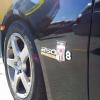Turbo Vehicles And What Could Have Been...
Announcements
-
Similar Content
-
Latest Posts
-
Yeah got a photo but not the moet visible. It wasn't deep enough to warrant me pulling it out. What sort of panel beating did you mean, just pulling out the dent? The block doesn't flex but if I push enough with my finger it will indent the foam but will return to flat after a few minutes but as long as I don't do that it remains flat. Temporary as in just to protect from rust until I work on it again. I will remove it before putting filler again.
-
I don't think the shuffle can damage the turbos. It only happens at low shaft speeds and loads. It's just annoying (to some people - others are tickled by the effect) and it quite possibly reduces spool performance a little bit.
-
By Murray_Calavera · Posted
Oh dear. The panel beating needs to be done before the filler work. Do you have a photo of the dent before you started? Hard enough to not flex and only hit the high spots? What do you mean it was just temporary? -
Can u check this way it works for power supply?
-
These coils draw 10amps that what i read online
-






Recommended Posts
Create an account or sign in to comment
You need to be a member in order to leave a comment
Create an account
Sign up for a new account in our community. It's easy!
Register a new accountSign in
Already have an account? Sign in here.
Sign In Now